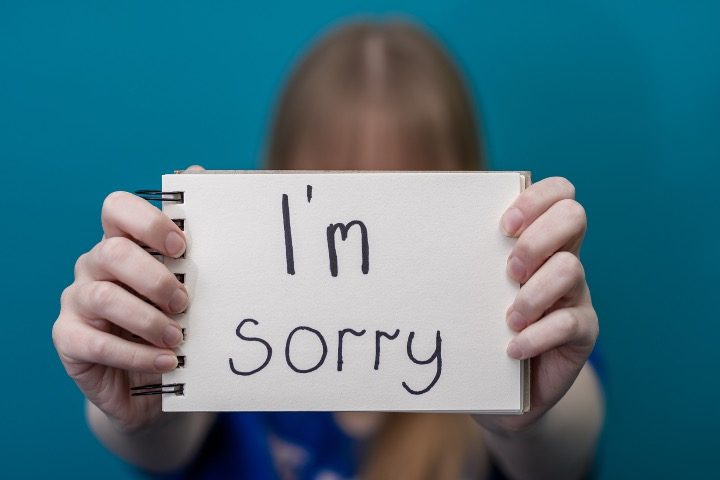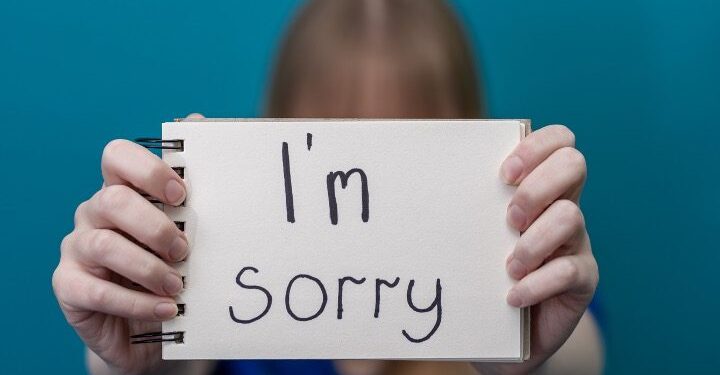
With narcissists being known for their stubborn refusal to apologize, some parenting advice gaining traction today could make a person wonder:
Will narcissism be the wave of the future?
Never Say I’m Sorry?
After all, the child-rearing counsel in question holds that you should never tell your kid to say sorry. In fact, doing so, the thinking goes, “is useless, unnecessary, even harmful,” writes The Atlantic.
No, this new theory wasn’t authored by our Covid response team, but is advocated by entities/individuals such as “Big Little Feelings, the tremendously popular Instagram account and parenting course, and Dr. Becky, the internet-appointed headmistress of the school of Millennial parenting,” The Atlantic relates. The magazine then explains: “Telling your children to apologize, the argument goes, is useless”
because it will produce an empty apology. Unnecessary because there are other, better ways to teach children to make amends. Harmful because—well, accusations of harm run the gamut: It will train children to lie or to apologize only as a formality to escape punishment; make them “less kind and thoughtful”; alienate them from their feelings; or shame them into never apologizing again.
… Broadly, those opposed to forced apologies would argue that for an apology to have any value, it must be rooted in genuine remorse. They would say that young kids lack the cognitive capacity to empathize with someone they’ve hurt, and that simply telling them to apologize won’t help them develop empathy.
This theory’s guiding principle will sound familiar, too. It “seems to be to take children’s current or future feelings into consideration at every parental decision point,” The Atlantic points out — “even when they are the ones who have hurt the feelings of someone else.”
Sounds like a good way to breed a self-centered little prince or princess. It also aligns with our time’s exaltation of emotion, a phenomenon illustrated by research showing that modern Americans are most likely to make “moral” decisions based on what “feels right.”
Interestingly, even the liberal Atlantic casts doubt on this parenting style, writing that the “idea that anything less than a freely volunteered apology is worthless is unsupported by research.” The style does reflect styles, though, if headlines lamenting today’s loss of civility (e.g., “Civility is now countercultural”) are any indication. It also apparently ensures the problem will only worsen.
Do We Always Like What’s Good for Us?
In reality, bemoaning “empty,” going-through-the-motions apologies misses the point. Just consider the plenitude of things a child must do that he perhaps won’t have his heart in. Brushing his teeth, bathing, doing chores, learning math and spelling, and eating vegetables are just a handful. But would you refrain from teaching him arithmetic until it was plain he had passion for it? Would you let him walk around filthy until he began fancying washing fun?
The whole idea, in fact, is to compel a child to bathe and practice good hygiene until it becomes habitual. Is it any different with good behavior?
As philosopher Will Durant put it, “We are what we repeatedly do.” Sure, a child’s manners will at first be superficial. Why, as famed child psychologist Erik Erikson informed via his “stages of psychosocial development,” when a kid is in an early stage of such growth, he cannot even grasp moral principles; he only understands something is wrong when he’s punished for it.
Build the Frame First
This very human phenomenon has long been recognized in theology, too. That is, there’s “perfect contrition,” which is when you’re truly sorry for having sinned because you’ve violated the good and disobeyed God. But then there’s also “imperfect contrition”: when you’re sorry only because you fear punishment. The former is ideal, of course, but imperfect contrition suffices for forgiveness as well. It’s all some morally immature people are capable of, after all, and far better than obstinate refusal to acknowledge wrongdoing.
So what can be said about a young child’s “outside only” good behavior? It is much as how you first construct a building’s frame — and thus have for a time a sort of empty shell — and then incrementally fill it with a multitude of beautiful things. If raised correctly, the child will also be filled with beautiful things, but in the meantime he’s developing good moral habits, otherwise known as virtues.
In this vein, having to apologize is humbling and thus helps cultivate the root of all virtues: humility.
The “empty,” shallow actions can have another deep effect, too. That is, a child forced to regularly bathe may over time realize it feels better to be clean than dirty, and will then wash voluntarily and with pleasure. Likewise, a kid coerced into acting rightly and doing good, repeatedly, may come to realize it feels better to be good than bad and then voluntarily be good — from the heart.
Inculcating Manners
Again, though, “imperfect contrition” still has value. As The Atlantic related, “Especially among the youngest children,” even prompted “apologies can help repair kids’ relationships.” It’s part of inculcating manners, which are of the utmost importance. And perhaps no one explained their utility better than Anglo-Irish philosopher Edmund Burke.
“Manners are of more importance than laws,” he wrote in 1796. “Upon them, in great measure, the laws depend. The law touches us but here and there, and now and then. Manners are what vex or soothe, corrupt or purify, exalt or debase, barbarize or refine us, by a constant, steady, uniform, insensible operation, like that of the air we breathe in.”
Today, too many children are breathing in the fumes of faddish folderol justified with a now soulless soft “science” whose name, ironically, means “study of the soul.” This is tragic because as Professor Thomas Sowell has put it, “Each new generation born is in effect an invasion of civilization by little barbarians, who must be civilized before it is too late.” And one can only wonder:
When it is too late, and a nation is too corrupted to endure, will those responsible be able to say, “I’m sorry”?

































